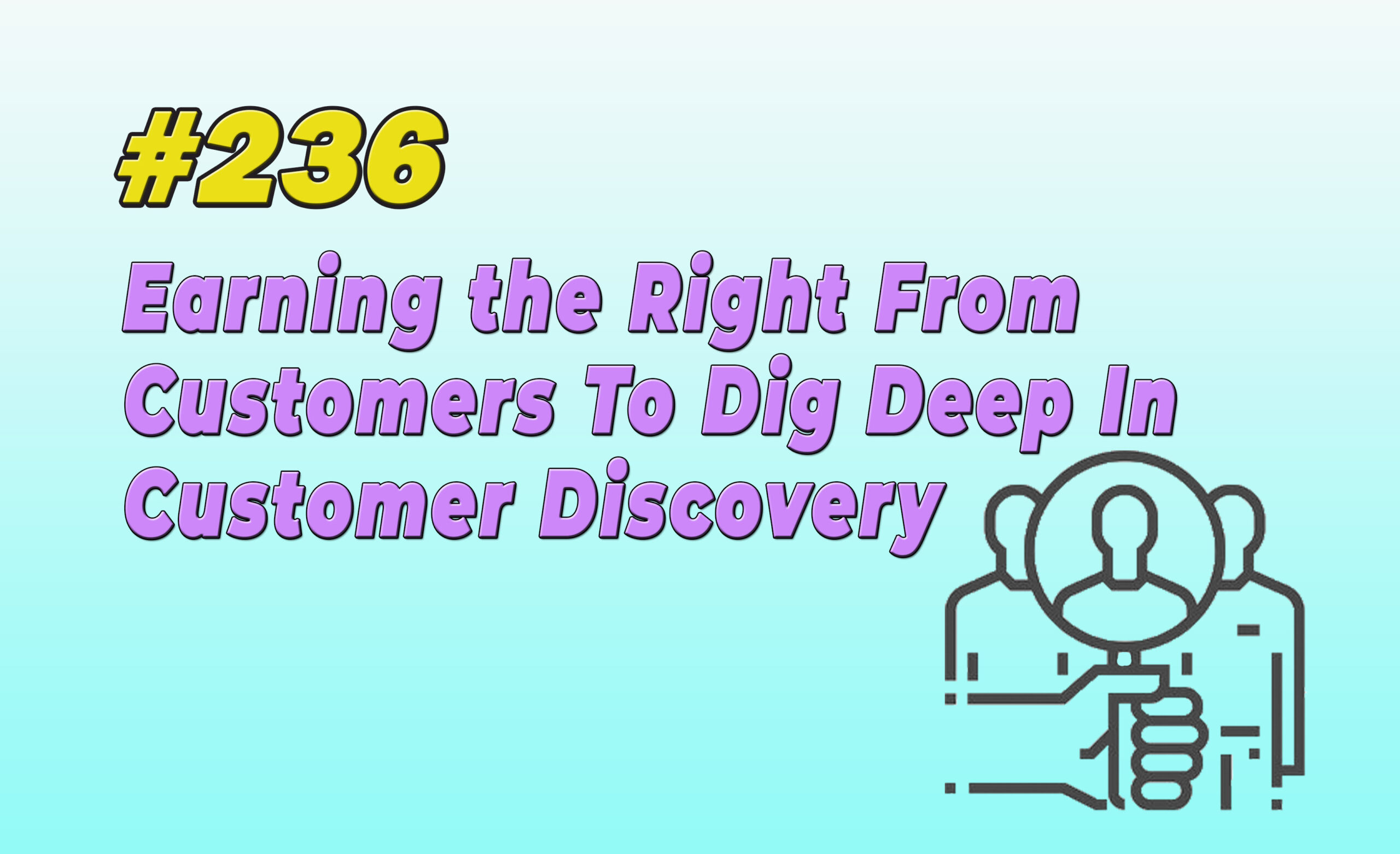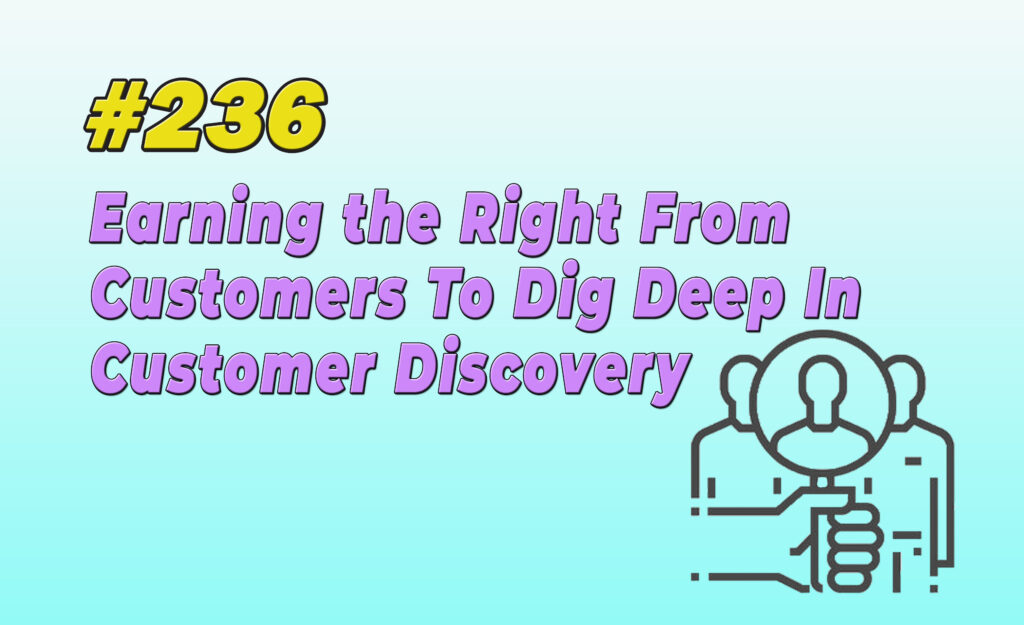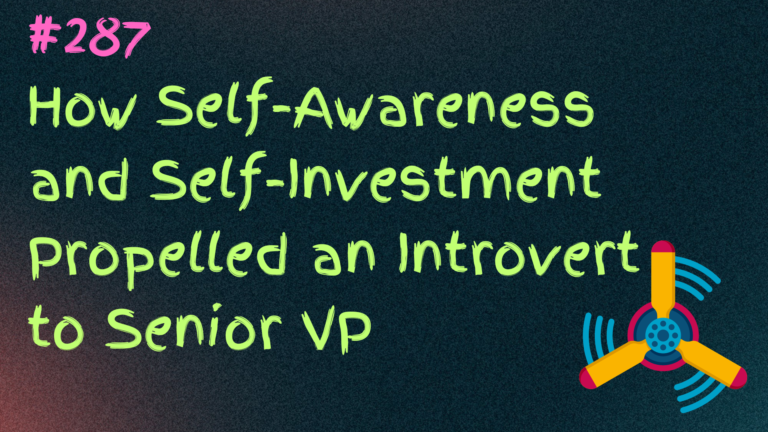Notes:
In the past, demos were the most important tool in a Sales Engineer’s arsenal. But now the focus has shifted to discovery. Why? It’s because people are more interested in trying to learn about a product rather than trying it out.
It’s crucial for Sales Engineers to be able to give a great demo, but it’s also important for them to be able to uncover what their potential customer needs and the challenges they face. The way to get better at discovery is to learn how to ask better questions and get feedback from customers.
If you’re interested in learning more about how to improve your discovery skills, then this episode is for you. In this episode, we walk you through the discovery process (Larson and I do a little roleplay to show you), mistakes most sales engineers and AEs make during discovery, questions to ask to better uncover your buyers’ needs and priorities, how to know whether they are qualified to purchase your product, and a little bit of how equity works for startups.
Larson Stair is the CEO and co-founder of Gondola, formerly known as Demoflow, a sales enablement solution that helps to codify the sales process – whether it’s discovery calls, product demonstrations with AEs and SEs, or better ways to be working together on those two parts of the sales cycle. Before starting his own company, Larson spent 10 years in the sales environment, having held multiple roles within SaaS as an SDR, SE, AE, and SC. He is deeply passionate about entrepreneurship, software start-ups, and full-cycle SaaS sales.
Key Takeaways:
- Larson shares the reason they decided to change the name of the company from Demoflow to Gondola
- More and more SEs and salespeople need more enablement for discovery than demos
- Should customers be talking more than vendors on discovery calls?
- What is the goal of the discovery process and what makes up a good discovery?
- Larson and I roleplay how discovery works: take note of Larson’s way of interviewing me and asking me questions
- One of the hardest things to do is scale the right things to close deals
- The key elements sales reps should be gathering and having a qualification call that would tee you up for a good discovery call
- How Larson teaches his salespeople to do discovery and learn the product enough to identify the customers’ possible pain points
- The MEDDPICC Method and Process
- Larson’s biggest challenge in doing discovery calls with customers
- The first question I ask when talking to a customer during the discovery
- How to handle feature requests from customers is very similar to how you should run a discovery
- How to respond when a customer is very adamantly demanding for a demo before the discovery
- Teaching the sales engineers and sales reps to highlight the product’s value rather than its features
- Why you should cascade your discovery questions accordingly; earn the right to ask questions
- What is equity and why many people do not want or know how to negotiate on equity
- When you leave an organization, what happens to your shares?
- Can a startup buy back its shares after a year?
- What most employees struggle with when it comes to finding equity
- Larson’s preference as a CEO: should an employee negotiate salary over equity, vice versa, or both?
Quotes:
“The people that do discovery most effectively have a real true business conversation; they come into the call with some notion of what that customer or buyer might be doing, what their business looks like, what the industry is doing, what they’re experiencing, and then it’s our job as the sellers to ask a lot of really thoughtful, educated questions to get those buyers to open up a bit, express some of the challenges that they’re going through, the goals that they’re trying to get to and why they can’t get there. It’s really just more of a conversation just back and forth, and just trying to dig deeper into what they’re trying to accomplish.” – Larson Stair
“A demo is useless if you don’t know if you haven’t done a proper discovery.” – Ramzi Marjaba
“If a customer calls me and says “I want this”, I want to know why.” – Ramzi Marjaba
“The biggest mistake I see is people forgetting that they’re in a discovery call them and just say “Let me just open my mouth here. Give me the mic. It’s my turn to talk, Coach. Put me in” and they just ramble on and on and on. And when you ramble, you’re talking about features, saying you don’t have a coordinated effort of what you’re trying to do with pausing points and questions and layering deeper and deeper. So keep it short, keep it real short. And don’t forget that you’re on a discovery call. Even if you’re on a demo, you’re on a discovery call, keep asking questions. And don’t forget that part.” – Larson Stair
“Only keep your equity if you believe in the company still, even if you got exited, or you left the company. If you don’t believe in where it’s going and like it’s going to do something then don’t waste your money. I think that’s really important. If you don’t believe it, then what’s the point?” – Larson Stair
“The most important thing is making sure you can live your life, you have a good livelihood because this startup life is so demanding, it’s so time intensive. And so I don’t want anyone to feel super strapped for cash if they join the company, so you have to know what you need, what are your fixed expenses, and what do you really have to bring in. And that’s the most important thing to me. And if you have the flexibility to negotiate for more equity, you should absolutely do that. Because that’s the longer-term game that would probably be my preference is the one I’d rather give equity to employees than to investors. They’re putting in all the work to help us get there.” – Larson Stair
“I certainly think it’s a muscle that you flex, right? You just have to you have to keep trying, to see where things fail or break down or whatever. And it also forces you to remove your ego. Because if you’re wrong so many times, I’m not worried about being wrong so I can make a decision. And you just get better over time.” – Larson Stair
Links from the show:
The Hard Thing About Hard Things by Ben Horowitz.
Sell More Faster: The Ultimate Sales Playbook for Startups by Amos Schwartzfarb
Connect with Larson Stair on LinkedIn
Check out Gondola on their website: https://www.gondola.ai/







